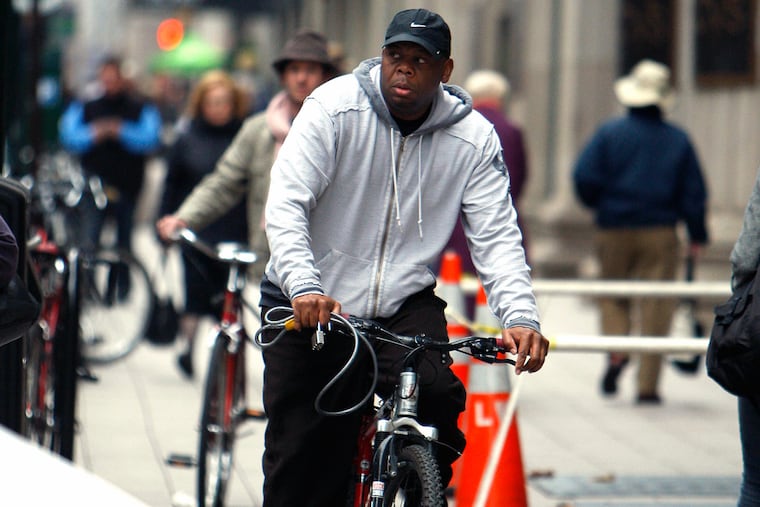Byko: Enforcement of vehicle, bike, pedestrian laws falls off a cliff
The laws are on the books, the cops are on the hook.

THE PHILADELPHIA Police Department has all but quit enforcing traffic laws on Philadelphia streets.
That's an exaggeration, but the number of tickets written to motorists, bicyclists, and pedestrians all took a nosedive in 2015. It was the third straight year of decline for motorists, the second for bicyclists, and the first for pedestrians. Enforcement is as low as a snail's belly.
This year, I'm adding tickets written for skateboarding. Two were written in 2013, 14 in 2014, and a lonely one in 2015.
The sole enforcement bright spot is in the Streets Department, which increased inspections of sidewalk cafés grabbing too much pavement. Tickets for these right-of-way violations increased from a woeful 23 in 2014 to 109 in 2015, an increase of 373.9 percent.
Last year, then-Streets Commissioner David Perri apologized for the failure to enforce the law, explaining that unique conditions in 2014 - such as "a huge increase in construction activity in Philadelphia, especially in Center City"- held down the effort.
He promised to do better next year. He did, dramatically so.
Late last year, Mayor Kenney named Perri to head Licenses & Inspections. We'll see if new Streets Commissioner Donald Carlton keeps up Perri's good record.
Elsewhere under police jurisdiction, enforcement collapsed, shredding the city's past promises that enforcement is required for bikes and cars and pedestrians to coexist.
The number of bicyclists ticketed plummeted from a puny 81 in 2014 to a measly 11 last year, a decline of 86.4 percent. The 2014 numbers were a 20.5 percent drop from the 102 written in 2013. There's a trend here, and not a good one.
A total of 303 pedestrians were ticketed in 2015, down 18.3 percent from the 371 ticketed during 2014. Pedestrian enforcement in 2014 actually rose 37.4 percent from the 270 tickets written the year before.
When we kick the tires on the car numbers, it's more bad news. A total of 91,633 motorists were ticketed for moving violations in 2015, a 20.9 percent drop from 2014 when 115,910 citations were handed out.
Last year, cops wrote 8,330 car tickets for each bicycle ticket and fewer than one bicycle ticket a month. That's really putting it out there.
Across the board, it's down, down, down. (All numbers were provided at my request by the Police Department, based on Traffic Court records.)
This is the third consecutive year of less enforcement on lawbreaking motorists. Because the laws are written to promote safety, lack of enforcement makes it more dangerous for everyone. It's not just me saying it.
"Given that 100 people on average are killed in Philadelphia in traffic crashes annually, any decline in enforcement is not a good thing," said Sarah Clark Stuart, executive director of the Bicycle Coalition of Greater Philadelphia.
Both the city and the Bicycle Coalition are on the record as supporting better education, enforcement, and engineering, or street design.
Stuart mentioned Vision Zero, a comprehensive program that addresses all three elements. The Kenney administration supports the program but has not set a target date, Stuart said.
Cars create the greatest danger. In 2014, 1,548 Philadelphians were struck and injured by cars, which is more than were shot.
There are several possible reasons for fewer tickets being written. Police spokesman John Stanford said, "We're down probably about 100 or so officers," and the papal visit and allied planning pulled officers from other duties. "Not that I am blaming the papal visit," he said, also pointing to a national trend of police departments writing fewer tickets.
Wha?
Money magazine last year reported a decrease in traffic tickets in Nevada, Wisconsin, Ohio, and Pennsylvania.
Even so, Philly's decline is off the charts.
Stanford insists that all laws are enforced, but that police have priorities. Crime gets priority over jaywalking, for example.
Of course, but cops aren't chasing robbers and murderers 24/7, and when they're not, they could be stopping speeders or bicycles on sidewalks.
In 2013, the city launched a "Drive Right, Ride Right and Walk Right" safety campaign. Engineering, education and enforcement were all to play a role. Despite promises from city officials and police brass, the numbers show that enforcement is absent.
But, OK, this is 2016, Michael Nutter has left to make tons of money in the private sector, and Police Commissioner Charles H. Ramsey is gone, replaced by Richard Ross.
Enforcement obviously is not a priority for the cops. It won't be a priority until it is made a priority by Ross, who works for Kenney, whose office ignored requests for comment.
Speaking for Ross, Stanford did comment. He said the fewer tickets might be explained by officers giving warnings rather than tickets, to retain good relations with the community.
I sort of understand that, and sort of question its wisdom. At what point do you cease turning a blind eye to curry favor?
Stanford also suggested that various educational programs might be having a positive effect and that drivers and bikers and walkers may have improved their behavior. I am on city streets every day and any improved behavior is inversely proportional to the unicorns I see.
Here's a concept that's not hard to follow: Traffic laws are written to create a safe environment, and when they are not followed, things are less safe. The rules are followed less when they are enforced less.
Less enforcement means less safety. Simple, really.
What we need, for safety's sake, is enforcement.
Will we get it?
215-854-5977 @StuBykofsky
Blog: ph.ly/Byko
Columns: ph.ly/StuBykofsky